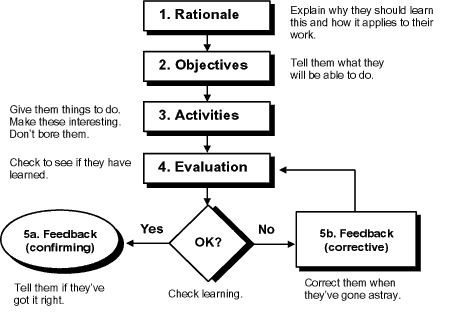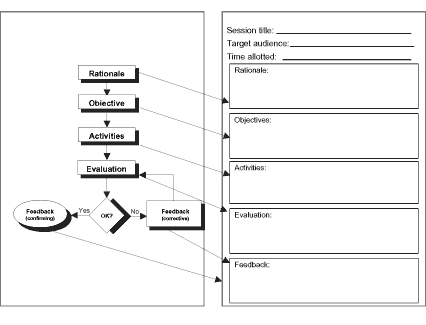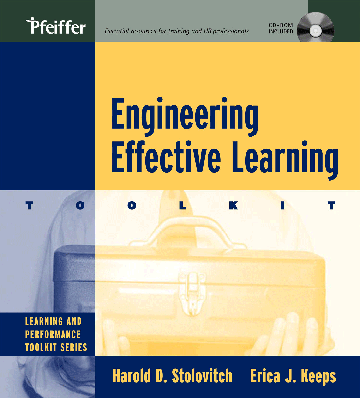Welcome to the fourth edition of the HSA e-Xpress. We feel it's important to keep you up-to-date on what's going on in our field as well as within HSA. This issue features articles on selecting learning and performance vendors, building a training session plan as well as much more. We hope you enjoy this edition. Ready? Here we go...
![]()
By Erica J. Keeps & Harold D. Stolovitch
ekeeps@hsa-lps.com & hstolovitch@hsa-lps.com
 As
outsourcing becomes more popular, one of the most important sets of tasks
the performance consultant carries out is the selection of learning and
performance vendors. The tasks include identifying potential resources,
verifying capabilities and track records, maintaining an expanding database
of resources, matching resources to specific project requirements, and
in some cases, actually contracting for services.
As
outsourcing becomes more popular, one of the most important sets of tasks
the performance consultant carries out is the selection of learning and
performance vendors. The tasks include identifying potential resources,
verifying capabilities and track records, maintaining an expanding database
of resources, matching resources to specific project requirements, and
in some cases, actually contracting for services.
Because interventions can differ markedly, the nature of the resources the performance consultant outsources to will also differ in many ways. Nevertheless, there are some general criteria that apply for selecting external resources regardless of specialty or type. The following table provides a list of these criteria with explanations and suggestions for verifying how well a resource meets each of these.
Criteria for Selecting Learning and Performance Resources
|
Criteria
|
Verification
Suggestions
|
| Expertise: The resource must possess qualifications and demonstrate knowledge/skill to perform. These may include technical, content or process competencies sufficiently advanced to allow the resource to perform with minimal support. |
|
| Track Record: The resource should be able to provide references and examples of previous work. Length of time performing the required work and evidence of success with similar projects are important elements of this criterion. |
|
| Resources: Particularly for large projects, the persons or groups selected must be able to supply sufficient human and material resources to complete the job within the time frame. |
|
| Knowledge/Experience working with the industry: Previous experience with or sound knowledge of the industry makes it easier for the resource to come up to speed on the project. Although not always essential, this type of experience can also decrease length of learning curve. |
|
| Cost: Similar resources may vary considerably in cost. However, higher-priced resources may be worth additional expense due to capability, experience and less rework. Cost, all other things being equal, is a factor to consider. |
|
| Credibility: Clients must have confidence in the resources they engage for their projects. In addition to qualifications and experience, resources that project competence and present information clearly are usually viewed as more credible. |
|
While cost is often a major factor in the selection of learning and performance vendors, it should not be the sole basis on which decisions are made. If you receive a proposal that is considerably more costly than others, it is worthwhile determining why. Is the solution being offered more expansive than the others? Do technology requirements drive the price up? While one cannot infer that a higher price will necessarily yield a higher quality product/service, it is also true that a price that is dramatically different than others may be a result of misunderstanding the need, inaccurate assumptions or varying project conditions. Finally, when reviewing costs, place greater emphasis on value than on price.
In addition to the general criteria listed in the table, consider other selection criteria specific to a project, such as quality of the proposal, feasibility of proposal time lines or responsiveness to your organization's needs.
Key to the selection of appropriate learning and performance resources is the quality of the client-generated Request for Proposal (RFP). The more information you can share with prospective vendors with respect to the project background, target audience, project goals, constraints, budget, deadlines, etc., the more specific the vendor can be in responding to your needs. Generally, high quality RFPs result in high quality proposals. Providing ample time to do a credible job in proposal development also usually results in a better quality of proposals you receive. Being accessible to clarify points and provide details perhaps overlooked in the RFP can make the difference in obtaining proposals that are meaningful and allow you to make the wisest decisions.
HSA
LEARNING & PERFORMANCE SOLUTIONS LLC is
a valued learning and
performance resource to client organizations worldwide. Its 80 associates
located throughout North America have experience in a wide range of
industries. HSA welcomes opportunities to respond to your RFPs.
To learn more about HSA, visit our Website at www.hsa-lps.com.
![]()
By Harold D. Stolovitch & Erica J. Keeps
hstolovitch@hsa-lps.com & ekeeps@hsa-lps.com
Designing a training session may seem like an arduous task...especially for subject-matter experts (SMEs) anointed trainer. However, it needn't be difficult nor formidible. What follows is a universal model for structuring any learning session. Applying this model can provide you with an instantly successful result.
Annotated Five-Step Model for Structuring Training

Examine the next figure and note how we have transformed the five-step model into a training session plan. The plan enables you to take a first cut at creating your training session. Also note two of its key characteristics. First, it is not content-centered. Rather, it forces you to think about the learners. It begins with the requirement for a rationale that provides meaningful benefits to learners. It also requires learner-centered, performance-based objectives that are meaningful to and valued by the learner. It specifies the activities that will lead the learners to objective attainment. Activities must maintain at least a 50-50 balance between learner and instructor or instructional content in self-paced mode. It then asks how learner attainment of the objectives will be evaluated.
The final step, corrective and confirming feedback, should be a natural outgrowth of the evaluation and spontaneously adapted to how each learner performs. It may be useful, however, to anticipate where difficulties will occur and how these can best be addressed if the learner needs to be brought back on track.
Second, note the brevity and simplicity of the training plan. You are asked to think about each session and then write your plan in bulleted format. The natural tendency of content specialists or SMEs is to fill up a training session plan with content. Here, instead, you are asked to focus first on the customer. When you have planned your training-learning strategy, you can go for the necessary, relevant content that the learners can absorb and retain.
Training
Session Plan

This
article is based on Harold and Erica's book,
Telling Ain't Training. To
purchase a copy, click here.
HSA
now offers a Telling Ain't Training Workshop. To learn more about it,
click here
and then on the Telling Ain't Training Workshop outline.
For
the Workshop agenda, contact Jennifer Papineau,
Seminar Coordinator at jpapineau@hsa-lps.com.
To
schedule a Telling Ain't Training Workshop,
contact Erica Keeps at ekeeps@hsa-lps.com.
![]()
 We
are pleased to announce the recent release of the Enginnering Effective
Learning Toolit on July 24, 2003. The Engineering Effective Learning
Toolkit offers a systematic step-by-step approach for designing, managing
and evaluating successful training, learning and performance projects.
Harold D. Stolovitch and Erica J. Keeps, international leaders in the
field of workplace learning and performance and co-editors of both editions
of the Handbook of Human Performance Technology and co-authors
of the best-selling, award-winning Telling Ain't Training, have
designed this toolkit based on their popular instructional design course
that has been conducted and tested with hundreds of leading organizations
worldwide. A hands-on resource, the Engineering Effective Learning
Toolkit is filled with illustrative, real-world examples and includes
a CD-ROM with easily reproducible and customizable information charts
and job aids to help you accomplish each step in the instructional design
process. This indispensable toolkit is a personal "coach" you
can refer to on an "as-needed" basis or use to complete a training
project from start to finish.
We
are pleased to announce the recent release of the Enginnering Effective
Learning Toolit on July 24, 2003. The Engineering Effective Learning
Toolkit offers a systematic step-by-step approach for designing, managing
and evaluating successful training, learning and performance projects.
Harold D. Stolovitch and Erica J. Keeps, international leaders in the
field of workplace learning and performance and co-editors of both editions
of the Handbook of Human Performance Technology and co-authors
of the best-selling, award-winning Telling Ain't Training, have
designed this toolkit based on their popular instructional design course
that has been conducted and tested with hundreds of leading organizations
worldwide. A hands-on resource, the Engineering Effective Learning
Toolkit is filled with illustrative, real-world examples and includes
a CD-ROM with easily reproducible and customizable information charts
and job aids to help you accomplish each step in the instructional design
process. This indispensable toolkit is a personal "coach" you
can refer to on an "as-needed" basis or use to complete a training
project from start to finish.
Engineering Effective Learning Toolkit is the first book in the Learning and Performance Toolkit Series. The next in the series, Front-End Analysis and Calculating Worth and Return on Investment Toolkit, will be launched autumn 2003.
Here's what reviewers have to say:
Watching great instructional design is like observing great ice skating. The audience is wowed by the flow and beauty and usually has no inkling about all it took to get there. Erica and Harold know how to make the magic happen. They also know how to make it easy for their readers. They offer us all the ingredients for their special choreography.
-
Beverly Kaye, CEO and founder, Career Systems International and author,
Up Is Not The Only Way; co-author, Love 'Em or Lose 'Em: Getting
Good People to Stay
As a training manager for the last 20 years, I have used and implemented the Stolovitch and Keeps Engineering Effective Learning process. It has proven to be very efficient in designing, developing and implementing instructional interventions. I am thrilled to see that this process will now be available to all!
- Daniel Dupont, Chief Learning Officer, Société des Alcools du Québec
If you're involved with the design of learning, then this book has something to offer you. From beginner to the most advanced instructional designer, there are tools and tips that you can immediately and effectively put to use!
- Frank S. Wilmoth, Director for Learning Excellence, Prudential Real Estate and Relocation Services
To order a copy of Engineering Effective Learning Toolkit, click here.
![]()
 It's
your last chance to take advantage of our summer seminar discount promotion.
For all workshops scheduled prior to Labor Day, HSA is offering a 10%
discount. Take advantage of the summer slow-down to develop your organization's
training delivery, instructional design and performance consulting competencies.
The valued workplace results are incentive enough - better training, more
effective learning, transfer of learning to the job and improved performance.
It's
your last chance to take advantage of our summer seminar discount promotion.
For all workshops scheduled prior to Labor Day, HSA is offering a 10%
discount. Take advantage of the summer slow-down to develop your organization's
training delivery, instructional design and performance consulting competencies.
The valued workplace results are incentive enough - better training, more
effective learning, transfer of learning to the job and improved performance.
For more information on any of our seminars, click here.
For any of the workshop agendas, please contact our Seminar Coordinator, Jennifer Papineau, at jpapineau@hsa-lps.com.
Our calendar is filling up fast so don't delay. Book your seminar today! Contact Erica Keeps at ekeeps@hsa-lps.com to reserve a workshop date or to answer your questions.
![]()
 On
June 13, 2003, the Call Center Consortium (CCC) hosted a mini Think Tank
via teleconference to work on the business of call centers with experts,
colleagues and peers. A total of 12 leaders gathered to share best practices
and ideas concerning recruitment and enrichment in call centers while
collaboratively brainstorming some innovative solutions. Participants
represented both large and small organizations from a variety of industries
and geographic locations. Experts from two of the three consortium firms:
Decision Toolbox and Career Systems International faciliated, participated
and presented.
On
June 13, 2003, the Call Center Consortium (CCC) hosted a mini Think Tank
via teleconference to work on the business of call centers with experts,
colleagues and peers. A total of 12 leaders gathered to share best practices
and ideas concerning recruitment and enrichment in call centers while
collaboratively brainstorming some innovative solutions. Participants
represented both large and small organizations from a variety of industries
and geographic locations. Experts from two of the three consortium firms:
Decision Toolbox and Career Systems International faciliated, participated
and presented.
The networking was great! The ideas were terrific! We've only just begun! The CCC is organizing future mini teleconference Think Tanks to discuss recruitment, performance and retention. If you are interested, please contact Erica Keeps at ekeeps@hsa-lps.com.
To
learn more about the CCC, visit our Website at www.callcenterconsortium.com.
![]()

Partner, colleague,
friend and best-selling author, Beverly Kaye, will be releasing a new
book this fall along with co-author Sharon Jordan-Evans. Love It, Don't
Leave It: 26 Ways to Get What You Want at Work is intended to help
every worker find the meaning and satisfaction they want...right where
they are...now. You're invited to read a sneak preview of the first three
chapters by clicking here.
![]()
Harold Stolovitch and Erica Keeps were recently interviewed by the American Society for Training and Development (ASTD) on their best-selling, award-winning book, Telling Ain't Training. To read their two-part interview, click here.
![]()
 Harold
Stolovitch and Erica Keeps will be presenting this September in Australia
at ISPI Melbourne and ISPI Sydney. Harold will also be presenting at the
Online Learning Conference in Los Angeles, CA on September 22, 2003. Click
here
to view HSA's Events Calendar to learn where and when they'll be as well
as read session descriptions.
Harold
Stolovitch and Erica Keeps will be presenting this September in Australia
at ISPI Melbourne and ISPI Sydney. Harold will also be presenting at the
Online Learning Conference in Los Angeles, CA on September 22, 2003. Click
here
to view HSA's Events Calendar to learn where and when they'll be as well
as read session descriptions.
![]()
The International Society for Performance Improvement (ISPI) invites you to attend the 2003 Performance-Based Instructional Systems Design (ISD) Conference, September 17-20, 2003, at the Palmer House Hilton Hotel in Chicago, IL. The conference is devoted to presenting, discussing and debating the latest models, practical methods, tools and case studies for the design, measurement and evaluation of learning programs and interventions. Today's models and methods must look beyond learning to address performance goals. ISD will be examined as a systematic approach to improving performance - that is, to defining and delivering success. Attendees will take away valuable hands-on solutions to their most critical challenges in ISD and will return to their employers and clients with the tools necessary to improve performance and deliver success.
Instructional systems designers and other managers and professionals involved in design, development, delivery and evaluation of performance improvement and training should attend the conference and pre-conference workshops. The case studies, presentations and discussions will be equally valuable to professionals involved in classroom, distance and electronic learning. All sectors including academia, business, consulting, government, military and not-for-profit will benefit by attending.
Attendance is limited to 250 participants making this event an intimate opportunity to network with fellow colleagues and presenters. For more information or to register to attend, visit www.ispi.org/isd2003.
![]()
 Do
you have any burning human performance technology questions? Visit the
Ask Harold section of HSA's Website
and ask your questions for Harold Stolovitch to answer. There have been
some recent submissions that might intrigue you, like:
Do
you have any burning human performance technology questions? Visit the
Ask Harold section of HSA's Website
and ask your questions for Harold Stolovitch to answer. There have been
some recent submissions that might intrigue you, like:
When conducting a needs analysis, what are the most important questions to ask?
To read the response, visit Ask Harold. To ask your own question, just click on the crystal ball above, fill out the form and click submit.
For more information on HSA, visit our Website at www.hsa-lps.com, email us at info@hsa-lps.com or call us toll free at (888) 834-9928.
If you have any questions or comments, please feel free to contact Samantha Greenhill, Publications and Communications Specialist, at sgreenhill@hsa-lps.com.
To unsubscribe from this Newswire, please reply to this email and put the word UNSUBSCRIBE in the subject line.
© Copyright 2003 Harold D. Stolovitch & Erica J. Keeps